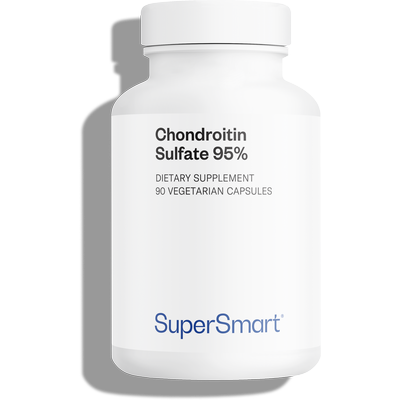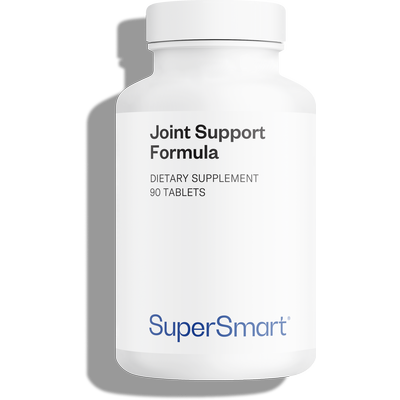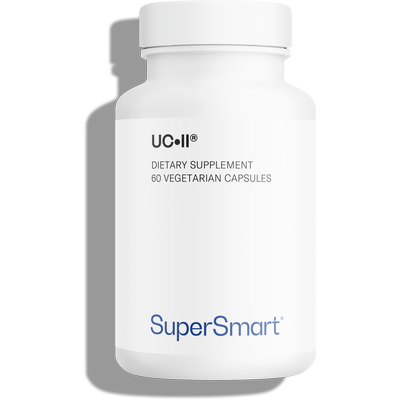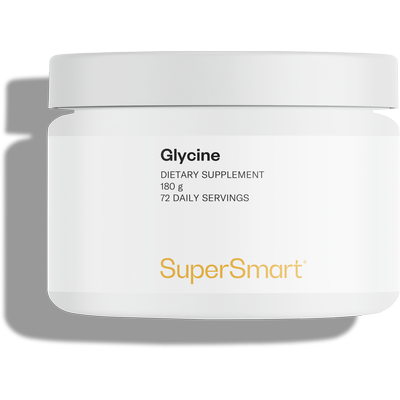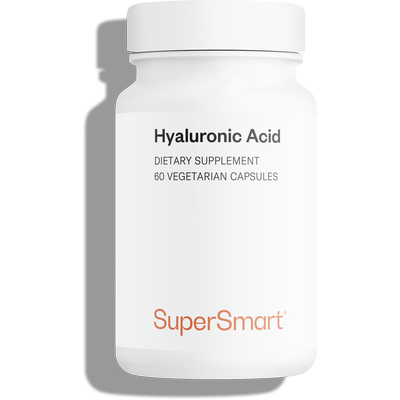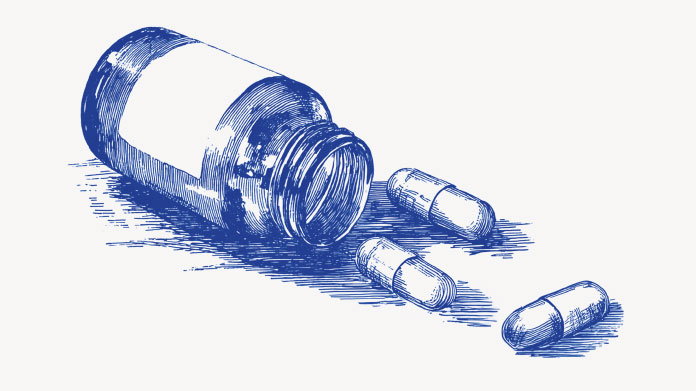4 supplements for regenerating cartilage
Many people (especially the over-65s) take supplements to help regenerate their cartilage, which may be damaged by inflammation, wear and tear or repeated trauma. Discover the 4 best supplements for supporting cartilage.

Why might supplements be needed to help regenerate cartilage?
Cartilage: one of the few tissues with limited regeneration
Both flexible and tough, cartilage plays a crucial role in the body, covering the ends of bones at their joints to facilitate movement and absorb shocks.
Unlike other types of tissue (muscles, tendons, skin, etc.), cartilage has limited regenerative ability due to its low blood supply and cell density, and absence of lymphatic vessels and nerves.
In addition, chondrocytes - the cells that make up cartilage and produce the cartilaginous matrix (in particular collagen) - have a limited capacity for division and repair, especially in the adult body. Indeed, when damage occurs, healing is slow or virtually non-existent in adults.
Why does cartilage gradually wear out?
Over time, cartilage becomes damaged and less flexible.
Repetitive activities, the heavy loads placed on joints throughout life (compounded by excess weight), injuries, as well as the development of numerous conditions such as osteoarthritis, inflammatory disease and diabetes, and the cumulative effects of dietary deficiencies (espepcially vitamin D) all contribute to this progressive wear and tear.
Ways of slowing down cartilage degeneration
As it is difficult to regenerate damaged cartilage, it makes sense to do everything possible to slow down its deterioration and maintain it in an optimal state for as long as possible. For that, 3 measures are usually recommended (1):
- eat a sensible, balanced diet, both to provide the nutrients needed for healthy cartilage and to maintain an optimal weight and so reduce the pressure exerted on sensitive joints such as the knees and hips;
- take regular exercise, to stimulate blood flow to cartilage and strengthen the muscles around joints, though repetitive, high-intensity exercise should be avoided (heavy loads, road running, repeated jumps…);
- ensure any joint injury is treated promptly and carefully: untreated sprains, tears and fractures can cause irreversible damage to cartilage.
Research has, however, shown that cartilage regeneration can be stimulated to some degree, both through innovative surgical procedures and treatments (2), as well as the use of nutritional substances available in the form of dietary supplements.
4 dietary supplements good for cartilage regeneration
Key role of chondroitin in cartilage
Chondroitin is an essential component of cartilage, produced directly by the body. Many studies have suggested it is associated with cartilage reconstruction.
Three mechanisms of action are thought to be at play, though further research is needed: maintaining water in the cartilage matrix, inhibiting certain enzymes which destroy cartilage (primarily MMPs and aggrecanases) and stimulating chondrocytes to produce more material like collagen (3-5).
Its potential in terms of supplementation has long been played down because chondroitin is a very large molecule with relatively low absorption, but it seems this absorption rate (8%-20%) is still enough to produce clinical effects. It’s best to opt for marine chondroitin, recognised as offering high bioavailability (such as Chondroitin Sulfate 95%).
Glucosamine, natural support for the joints
Like chondroitin, glucosamine is produced by the body, under normal conditions, from glucose and glutamine. A number of studies have shown that cartilage degenerates when the glucosamine production process is disrupted.
Several mechanisms of action have been proposed for its potential restorative effect on the cartilaginous matrix: a key role in the natural production of several components of the matrix (glycosaminoglycans and proteoglycans), its contribution to joint lubrication, and its inhibition of destructive enzymes. Some synergistic joint supplements contain marine-source glucosamine sulfate (such as Joint Support Formula).
Type II collagen supplements
Returning to collagen, while the body is again theoretically able to produce this protein in sufficient quantities, it is absent in degenerative cartilage, yet to have any hope of repairing cartilage, optimal levels are essential.
Studies suggest that an exogenous intake of type II collagen may be able to stimulate the body’s own collagen production (6). It is found primarily in offal as well as in collagen supplements aimed specifically at cartilage (such as UC II®).
As a substitute, you can take glycine – one of the base materials of collagen production – combined with vitamin C, which supports collagen formation and normal cartilage function.
What effect do hyaluronic acid supplements have on cartilage?
While young people’s joints have a high level of hyaluronic acid the body’s production declines with age, resulting in the joints becoming painful and less flexible.
It is actually a key component of synovial fluid, which helps to absorb shocks and provide nutrients to cartilage chondrocytes. Without it, natural waste material and debris produced by wear and tear of the joints are not properly eliminated, impairing cartilage function and repair.
In an effort to regenerate seriously degenerated joint cartilage, visco-supplementation is often used, which involves injecting a hyaluronic acid-based gel directly into the joint, but there are also dietary supplements available that can provide high molecular weight hyaluronic acid absorbable by the body (such as Hyaluronic Acid).
SUPERSMART ADVICE
References
- Guo X, Xi L, Yu M, Fan Z, Wang W, Ju A, Liang Z, Zhou G, Ren W. Regeneration of articular cartilage defects: Therapeutic strategies and perspectives. J Tissue Eng. 2023 Mar 31;14:20417314231164765. doi: 10.1177/20417314231164765. PMID: 37025158; PMCID: PMC10071204.
- Muthu S, Korpershoek JV, Novais EJ, Tawy GF, Hollander AP, Martin I. Failure of cartilage regeneration: emerging hypotheses and related therapeutic strategies. Nat Rev Rheumatol. 2023 Jul;19(7):403-416. doi: 10.1038/s41584-023-00979-5. Epub 2023 Jun 9. PMID: 37296196.
- Modulation of inflammation by chondroitin sulfate. Vallières M, du Souich P. Osteoarthritis Cartilage. 2010 Jun;18 Suppl 1:S1-6. Review.
- Antioxidant, antiinflammatory and neuroprotective actions of chondroitin sulfate and proteoglycans. Egea J, García AG, et al. Osteoarthritis Cartilage. 2010 Jun;18 Suppl 1:S24-7. Review.
- Importance of pharmaceutical composition and evidence from clinical trials and pharmacological studies in determining effectiveness of chondroitin sulphate and other glycosaminoglycans: a critique. Rainsford KD. J Pharm Pharmacol. 2009 Oct;61(10):1263-70. Review.
- Sun L, Xu Y, Han Y, Cui J, Jing Z, Li D, Liu J, Xiao C, Li D, Cai B. Collagen-Based Hydrogels for Cartilage Regeneration. Orthop Surg. 2023 Dec;15(12):3026-3045. doi: 10.1111/os.13884. Epub 2023 Nov 9. PMID: 37942509; PMCID: PMC10694028.
Keywords
2 Hours
Prompt delivry !!👍
Prompt delivry !!👍
SWEET Christine
13 Hours
Good delivery and flawless quality
AS far as delivery and the visual quality are concerned, Supersmart is excellent. I will not comment on the efficacy of the products themselves, since that is only possible over a longer period and in a large customer base compared to people who do not consume a particular product.
Roger De Backer
1 Days
Perfect services
Perfect services, perfect support, great articles about products
Michaela Alali Beitlová
2 Days
Great experience and effective supplements
I’ve purchased many types of supplements from this company over the course of years to treat a few issues, and I’m satisfied with their quality. After using them consistently for a period of time, I can say they met my expectations and I could feel real health benefits that built up over time. Deliveries are always quick. I recommend this company to anyone looking for high-quality supplements.
Giordano
2 Days
Es hat alles gestimmt
Es hat alles gestimmt. Top
marina thieme
5 Days
Great product
Great product, but still evaluating its effectiveness. Highly recommended. Super efficient delivery.
Chalise
9 Days
Quality products
Quality products , efficient and effective customer service. You can’t ask more
CLaudia
15 Days
Good quality product and customer service.
So far, I'm liking this product, and the customer service was very good.
ELZL
22 Days
The products I use are excel·lent
The products I use are excel·lent
ROSAS Josep Maria
30 Days
Delivery is prompt and I never saw a…
Delivery is prompt and I never saw a quality problem with the manufacturing. It is not possible to assess efficacy on a personal basis, since too many factors come into play. Efficacy can only be assessed statistically with a sufficient number of cases.
Roger De Backer
31 Days
I collaborates with the Supersmart…
I collaborates with the Supersmart more than 10 years. Every thing is going good. Quality of the things is good. Delivery comes in time. Five stars definitely !!!
Oleksiy
31 Days
All good
Simple, frictionless site, easy ordering, good delivery updates and execution.
Chris Robbins
33 Days
I feel better
I feel better
Peter Ammann
33 Days
Prompt delivery
Prompt delivery
JAKUB Radisch
35 Days
My new go-to for top quality supplements!
I am buying more and more of my supplements from this superb, high quality company. Cannot recommend it enough. Plus, excellent customer service with a quick, helpful team and speedy deliveries. Highly recommend Supersmart!
Cecilie H.
of experience
your money back
##montant## purchase


